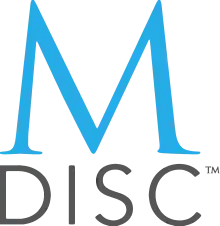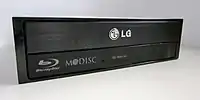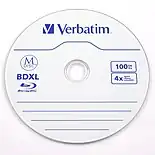M-DISC (Millennial Disc) is a write-once optical disc technology introduced in 2009 by Millenniata, Inc.[1] and available as DVD and Blu-ray discs.[2]
 | |
| Media type | write-once optical disc |
|---|---|
| Encoding | Universal Disk Format (UDF) |
| Standard | DVD, Blu-ray, Blu-ray BDXL |
| Developed by | Millenniata, Inc. |
| Manufactured by | Millenniata, Verbatim, Ritek |
| Dimensions | Diameter: 120 mm (4.7 in) |
| Usage | Archival storage |
| Extended from | DVD+R, BD-R, BD-R DL, BDXL-R TL |
| Released | 2009 |
| Optical discs |
|---|
Overview
M-DISC's design is intended to provide archival media longevity.[3][4] M-Disc claims that properly stored M-DISC DVD recordings will last up to 1000 years.[5] The M-DISC DVD looks like a standard disc, except it is slightly thicker and almost transparent with later DVD & BD-R M-Disks having standard and inkjet printable labels.

The patents protecting the M-DISC technology assert that the data layer is a glassy carbon material that is substantially inert to oxidation and has a melting point of 200–1,000 °C (392–1,832 °F).[6][7][8]
M-Discs are readable by most regular DVD players made after 2005 and Blu-Ray & BDXL disc drives and writable by most made after 2011.[9]
Available recording capacities conform to standard DVD/Blu-ray sizes: 4.7 GB DVD-R to 25 GB BD-R, 50 GB BD-R and 100 GB BDXL.
History
M-DISC developer Millenniata, Inc. was co-founded by Brigham Young University professors Barry Lunt, Matthew Linford, CEO Henry O'Connell and CTO Doug Hansen.[10][11][12] The company was incorporated on May 13, 2010, in American Fork, Utah.[13]
Millenniata, Inc. officially went bankrupt in December 2016. Under the direction of CEO Paul Brockbank, Millenniata had issued convertible debt. When the obligation for conversion was not satisfied, the company defaulted on the debt payment and the debt holders took possession of all of the company's assets. The debt holders subsequently started a new company, Yours.co, to sell M-DISCs and related services.
As of the 2020's there are only 2 licensed manufactures' M-Discs, Ritek sold under the Ritek and M-DISC brands and Verbatim produces co-branded discs, marketed as the "Verbatim M-DISC".[14][15]
128 GB BDXL never made it to market due to the 2016 bankruptcy.
Early in 2022, Verbatim changed the formulation of their "M-DISC" branded Blu-rays. These new discs could be written to at faster rate than previous ones, at 6x speed instead of 4x. The new discs also had different colouration and markings compared with older ones. Later in the year customers accused Verbatim of selling an inferior product and deceptive marketing.[16] Verbatim responded that the new discs were a further development of the older discs and should have the same longevity, and that the technical changes therein were responsible for the altered appearance and higher write speeds.[17]
Durability claims
M-DISC passed the testing standards of both ISO/IEC 10995:2011[18] & ECMA-379 with a projected rated lifespan of several hundred years in archival use.
The glassy carbon layers, in theory if preserved correctly in an environment like a salt mine, could store the data for over 10,000 years before going outside of readable spec. However, the polycarbonate plastics, which are commonly used by almost all optical media and heavily in CBRN and ballistic protective equipment due to their optical, physical impact and chemical resistant properties, have a lifespan rating of only around 1000 years before degradation.
Durability testing
In 2009, testing was done by the US Department of Defense (DOD) producing the China Lake Report[19] testing Millenniata's M-Disk DVD to current market offerings from Delkin, MAM-A, Mitsubishi, Taiyo Yuden and Verbatim with all brands using organic dyes failing to pass the series of accelerated aging tests.
In 2012 (2010-2012), the French National Laboratory of Metrology and Testing (LNE) used high-temperature accelerated aging testing,[20] at 90 °C (194 °F) and 85% relative humidity inside a CLIMATS Excal 5423-U, for 250~1000 hours with a mix of in-organic DVD+R discs from MPO, Verbatim, Maxwell, Syylex & DataTresor, summary of the tests states Syylex GlassMasterDisc was rated for 1000+ hours, DataTresorDisc 250 hours+ & M-Disk under 250 hours.
In 2016, a consumer Mol Smith[21] did real world stress testing on the 25GB BD-R M-Disc alongside TDK's standard BD-R 25GB disc, which demonstrated the reliability of M-Disc's molding compared to standard discs; after 60 days of outdoor direct exposure the M-Disk was verified without error, while the TDK disc was physically destroyed.
In 2022, the NIST Interagency Report NIST IR 8387[22](Page 12), stated that M-Disc is an acceptable archival format rated for up to 100 years+.
Commercial support
While recorded discs are readable in conventional DVD & BD drives, they can only be burned by drives with firmware that supports the slightly higher power mode that M-Disk requires for burning its inorganic layers, as such writing speed is typically 2x speed.
Typically, the M-Discs cost 1.5–3x the price of standard Blu-Ray discs with DVD M-Discs now having sparse availability.
With the first-generation DVD M-DISCs, it was difficult to determine which was the writable side of the disc due to being near fully translucent, until coloring and later labels similar to that on standard DVD discs was added to discs to help distinguish the sides preventing user error.
Asus, LG Electronics, Lite-On, Pioneer, Buffalo Technology, and Hitachi-LG produce drives that can record M-DISC media while Verbatim produces M-DISC discs.
Adoption
The regional government of the U.S. state of Utah has used M-Disc since 2011.[23]
Many consumers and avid datahoarders have adopted the format for cold digital data storage.
M-Disc alternatives
Optical
Syylex Glass Master Disc:[20] Blu-Ray 25GB & Blu-Ray 50GB - Fabricated on demand at the cost of €1000[24] (EUR) per disc these discs use etched glass and are only typically degradable by physical or chemical damage, but not by normal ageing inside an archival environment.
Current BD 25GB, BD-DL 50GB & BDXL 100GB (3 Layer) & Sony's BDXL 128GB (4 Layer) discs are rated for up to 50 years (Standard in-organic HTL discs)
Sony's Optical Archive, is an optical competitor to the LTO data tape system, currently with up to 5.5TB cartridges of dual-sided 120mm discs, with desktop readers and automated rackmount standard archival systems allowing for large scale archival and data retrieval[25] rated for an estimated 100+ years.
Magnetic
Linear Tape-Open (LTO) is rated for up to 30 years in a climate-controlled environment and is currently in use by most industries, including broadcast and corporate digital data systems, with up to 45 TB (40.92 TiB) of compressed storage per cartridge on LTO's 9th generation.
Hard disk drives[26] are currently available up to 22TB (HDD) capacity in 3.5-inch format and 5TB in 2.5-inch laptop format. However, unlike optical media, they are limited to 5–25 years of operation lifespan due to inevitable mechanical failure or magnetic instability.
Solid State
Solid State Drives currently available in up to 100TB[27] solid state unlike mechanical has relatively limited read/write cycles, and data rot over short periods without power (1 year or more).
 M-DISC optical storage medium transparency demonstration
M-DISC optical storage medium transparency demonstration M-DISC (DVD) medium in an open case
M-DISC (DVD) medium in an open case



Notes
Accelerated thermal tests are only representative from a materials science perspective, this data is mostly used for manufacturing development, in the real world these discs would never pass 50 °C in real world situations as even basic burial archival depth of 1–2 meters would keep them in the >20 °C range.
Ideal storage condition, e.g., 15 °C and 10% RH
Controlled storage condition, e.g., 25 °C and 50% RH, using the Eyring model
Uncontrolled storage condition, e.g., 30 °C and 80% RH, using the Arrhenius model
References
- ↑ Wright, Randy (July 17, 2009). "Springville company introduces new DVD to protect data for a thousand years or more". Daily Herald. p. 1. Archived from the original on 2012-07-04. Retrieved October 18, 2022.
- ↑ "New 1,000-Year DVD Disc Writes Data in Stone, Literally". PCMAG. Retrieved 2022-10-18.
- ↑ Svrcek, Ivan (November 10, 2009). "Accelerated Life Cycle Comparison of Millenniata Archival DVD" (PDF). Life Cycle and Environmental Engineering Branch. 1 (1): 1–75.
- ↑ Maltz, Andy (February 21, 2014). "WILL TODAY'S DIGITAL MOVIES EXIST IN 100 YEARS?". IEEE Spectrum. p. 1. Retrieved October 18, 2022.
- ↑ "MDISC Archive Service". 2018-08-16. Archived from the original on 2018-08-16. Retrieved 2022-10-18.
- ↑ US8389095B2, Allred, David E.; Bard, Erik C. & Davis, Robert C. et al., "Optical data storage media containing substantially inert low melting temperature data layer", issued 2013-03-05
- ↑ US7613869B2, Lunt, Barry M. & Linford, Matthew R., "Long-term digital data storage", issued 2009-11-03
- ↑ "mDisc Review: A Thousand Years of Storage - Network Computing". 2014-08-21. Archived from the original on 2014-08-21. Retrieved 2022-10-18.
- ↑ "RITEK M-DISC BD DVD". www.ridata.com. Retrieved 2022-10-18.
- ↑ "Barry Lunt Website". Archived from the original on 2013-10-16. Retrieved 2012-10-12.
- ↑ "Matthew Linford Website". Archived from the original on 2018-08-17. Retrieved 2014-07-23.
- ↑ Douglas Hansen Biography Archived 2012-05-01 at the Wayback Machine
- ↑ "Springville company introduces new DVD to protect data for a thousand years or more" Daily Herald. Retrieved 17 July 2009.
- ↑ "Millenniata Archiving Blu-ray M-Disc Available in Spring 2013". 2013-09-15. Archived from the original on 2013-09-15. Retrieved 2022-10-18.
- ↑ "M-Disc™ Ready » The M-DISC™". 2014-03-25. Archived from the original on 2014-03-25. Retrieved 2022-10-18.
- ↑ "Verbatim M-Discs werden nicht als solche erkannt". ComputerBase. Retrieved 27 October 2023.
- ↑ "Langzeitarchivierung: Verwirrung um die M-Disc". c't – Magazin für Computertechnik. Heise Gruppe. 2022-11-22. Retrieved 27 October 2023.
- ↑ "ISO/IEC 10995:2011". ISO. Retrieved 2022-12-06.
- ↑ Ivan Svrcek (2009). Millenniata Archival DVD (M-Disk) China Lake Full Report November 10 2009.
- 1 2 Jacques Perdereau (2012). LNE Syylex Glass Dvd Accelerated Aging Report.
- ↑ "Micscape Microscopy and Microscope Magazine". 2022-08-28. Archived from the original on 2022-08-28. Retrieved 2022-12-05.
- ↑ NIST Interagency Report NIST IR 8387 Digital Evidence Preservation. 2022.
- ↑ "Notice of Proposed Sole Source Procurement" (PDF). State of Utah Division of Purchasing. 2011. Archived (PDF) from the original on 2012-10-29.
- ↑ "Glass Master Blu-Ray Discs". hofa-shop.com. Archived from the original on 2021-11-27. Retrieved 2022-12-06.
- ↑ "PetaSite Scalable Solutions - Sony Pro". pro.sony. Retrieved 2022-12-04.
- ↑ Jacobi, Jon (February 29, 2016). "Hard-core data preservation: The best media and methods for archiving your data". PCWorld. Retrieved 2022-10-24.
- ↑ Athow, Desire (2020-07-07). "At 100TB, the world's biggest SSD gets an (eye-watering) price tag". TechRadar. Retrieved 2022-12-30.